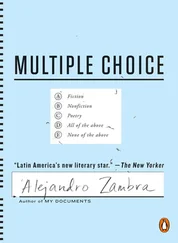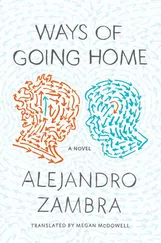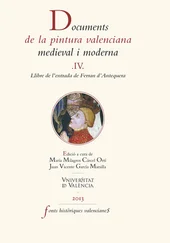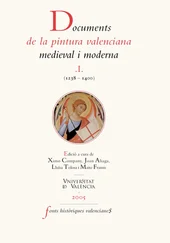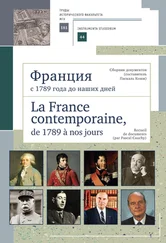“Who was it?” asks Bruno from the bedroom. Consuelo closes the door and hesitates a second before answering: “No one.”
Yasna fired the gun into her father’s chest and then suffocated him with a pillow. He was a gym teacher, and she wasn’t anything, she was no one. But she’s something now: now she’s someone who has killed, someone who sits in jail waiting for her shitty food and remembering her father’s blood, dark and thick. She doesn’t write about that, though. She writes only love letters.
Only love letters, as if that were nothing.
But it isn’t true that she killed her father. That crime never happened. Nor does she write love letters, she never has, maybe because she knows almost nothing about love, and what she does know, she doesn’t like. What she does know is monstrous. The one doing the writing is someone else, someone urgently recalling her, not because he misses her or wants to see her but simply because he was commissioned, a few months ago now, to write a detective story. Preferably one set in Chile. And right away he thought of her, of Yasna, of that crime that was never committed, and although he had dozens of other stories to choose from, some of them more docile, easier to turn into detective stories, he thought that Yasna’s story deserved to be told, or at least that he would be able to tell it.
He took a few notes at the time, but then he had to focus on other obligations. Now he has only one day left to write it.
The innocent part of the story, the least useful part, the part he won’t include, and that he doesn’t even fully remember — since his job consists, also, of forgetting, or rather of pretending that he remembers what he has forgotten — begins in the summertime, toward the end of the eighties, when both of them were fourteen years old. He wasn’t even interested in literature yet; back then the only thing that held his interest was chasing women, with timidity but also persistence. But it’s excessive to call them women — they weren’t women yet, just as he was not yet a man. Although Yasna was several times more a woman than he was a man.
Yasna lived a few blocks away. She spent her afternoons in the messy front yard of her house, surrounded by roses, rue shrubs, and foxtails, sitting on a stool, a block of drawing paper on her lap.
“What are you drawing?” he asked her one afternoon from the other side of the fence, momentarily emboldened, and she smiled, not because she wanted to smile, but out of reflex. In reply she held up the block, and from a distance it seemed to him that there was a face sketched on the paper. He didn’t know if it was a man’s or a woman’s, but he thought he could tell it was a face.
They didn’t become friends, but they went on talking every once in a while. Two months later she invited him to her birthday party, and he, breathing happiness, going for broke, bought her a globe in the bookstore on the plaza. The night of the party he ran into Danilo, who was smoking a joint with another friend on the corner — they had a ton of weed, they’d started growing it a while ago, but they still hadn’t made up their minds to sell it. Danilo offered him the joint, and he took four or five deep drags, and straightaway he felt the dulling effect that he knew well, though he didn’t smoke with any real frequency. “What’ve you got there?” Danilo asked him, and he’d been waiting for that question, hiding the bag precisely so they would ask him. “The world,” he replied with glee. They carefully undid the cellophane wrapping and spent some time searching for countries. Danilo wanted to find Sweden, but couldn’t. “Look how big that country is,” he said, pointing to the Soviet Union. They finished the joint before parting ways.
Yasna seemed to be the only one taking the party seriously. She wore a blue dress down to her knees; her eyes were lined, her eyelashes curled and darkened, and there was a shadow of shy sky blue on her eyelids. The music came from a cassette tape played end to end, one that was no longer in fashion, or that was in fashion only for the more or less fifteen guests crammed into the living room. They were clearly all good friends, they’d change partners in the middle of the songs, which they sang along to enthusiastically, though they knew absolutely no English.
He felt out of place, but Yasna looked over at him every two minutes, every five minutes, and the rhythm of those glances competed with the lethargy from the weed. After gulping down two tall glasses of Kem Piña, he sat down at the dining-room table as a new cassette started to play, Duran Duran this time. No-no-notorious . They danced to it strangely, as if it were a polka, or one of those old ballroom dances. It all seemed ridiculous to him, but he wouldn’t have said no to joining in, he would have danced well, he thought suddenly, with an inexplicable drop of resentment, and then he focused on the chips, on the shoestring potatoes, the cheese cut up into uneven cubes, the nuts, and a few dozen multicolored crunchy balls that struck him, who knows why, as interesting.
He doesn’t remember the details, except for the sudden lash of hunger, the wound of hunger: the munchies. He made an effort to eat at a normal speed, but when Yasna came in with the tortilla chips and an immense bowl of guacamole, he lost control. Tortilla chips and guacamole had only recently been introduced in Chile, he had never tried them before, he didn’t even know that was what they were called, but after trying one he couldn’t stop, even though he knew everyone was watching him; it seemed like they were taking turns looking at him. He had bits of avocado on his fingers, and tomato, and grease from the chips; his mouth hurt, he felt half-chewed bits of food stuck in his molars, he extricated them tenaciously with his tongue. He ate the entire bowl almost by himself, it was scandalous. And still he wanted to go on eating.
Just then the door to the kitchen opened and a white light hit him right in the face. A man looked out; he was fairly fat but brawny, his parted hair divided into two identical halves combed back with gel. It was Yasna’s father. Beside him was someone younger, very similar in appearance, you might say good-looking if it weren’t for the scar from a cleft lip, though perhaps that imperfection made him more attractive. Here ends, perhaps, the innocent part of the story: when they grab him tightly by the arm and he tries desperately to go on eating, and a few moments later, after a long and confused series of hard looks and clipped sentences, of scraping and dragging, when he feels a kick in his right thigh followed by dozens of kicks on his ass, his shins, his back. He’s on the floor, enduring the pain, with Yasna’s sobbing and some unintelligible shouts in the background; he wants to defend himself, but he barely manages to shield his groin. It’s the second man who is beating him, the one Yasna will later call the assistant. Yasna’s father stands there and watches, laughing the way bad guys laugh in lousy movies and sometimes also in real life.
Although none of this, in essence, interests him for his story, he tries to remember if it was cold that night (no), if there was a moon (waning), if it was Friday or Saturday (it was Saturday), if anyone tried, in all the confusion, to defend him (no). He puts his clothes on over his pajamas, because it’s the middle of winter and much too cold, and as he drives to the service station to buy kerosene, he thinks with confidence, with optimism, that he has all morning to work on his notes and in the afternoon he will write nonstop, for four or five hours, and then he’ll even have enough time, in the evening, to go with a friend to try out the new Peruvian restaurant that has opened up near his house. He fills the gas cans and now he’s at the Esso market, drinking coffee, chewing on a ham-and-cheese sandwich, and thumbing through the newspaper he got for free for buying a coffee and a ham-and-cheese sandwich. What they want from him is simply a blood-soaked Latin American story, he thinks, and in the margins of the news he jots down a series of decisions that take shape harmoniously, naturally, like the promise of a peaceful day at work: the father will be named Feliciano and she will be Joana; the assistant and Danilo are no good, nor is the marijuana, maybe a hard drug instead, and though he doesn’t really want to make Feliciano into a drug trafficker — too hackneyed — he does think it’s necessary to move the protagonists down in class, because the middle class — and he thinks this without irony — is a problem if one wants to write Latin American literature. He needs a Santiago slum where it’s not unusual to see teenagers in the plazas cracked out or huffing paint thinner.
Читать дальше

